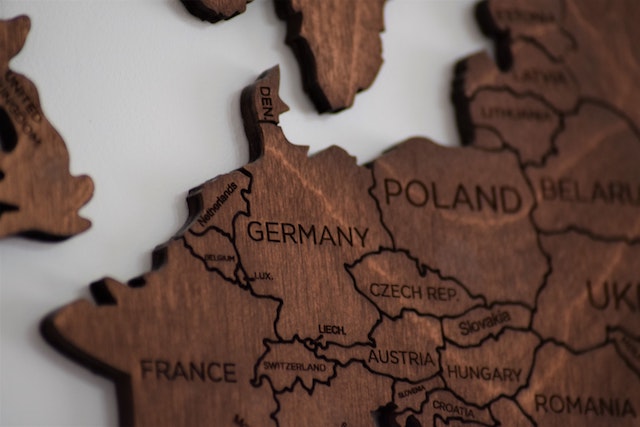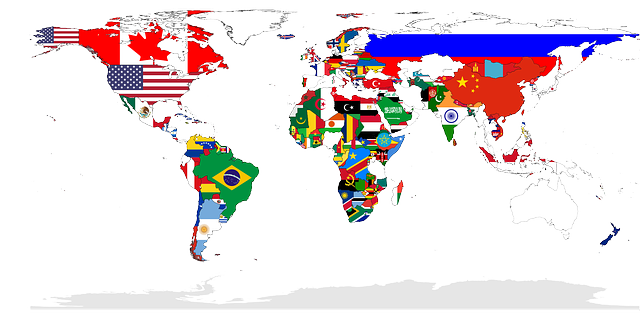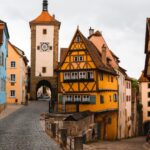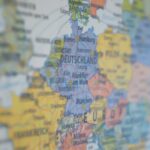Germany is a relatively new country that was created by joining together different tribes living in the land that we now know as Germany. The different words for Germany have been influenced by the countries that surround this land, as each group of people describes it using their own language.
The German Empire became a nation-state in 1871 but officially became Germany as it is known today only on 23 May 1949, a few years after World War 2 had ended. This makes it a young country, particularly when compared to countries such as America (1776), the United Kingdom (1707), Spain (1516) and Switzerland (1291). Naturally, before Germany, the land and the people in it still needed to have names. This is part of the reason for the variety of names given to Germany from different countries, as each people group had their own name that they used.

What Names Does Germany Have In Other Countries?
There are roughly 6 main categories that the different names for Germany come from. The name that different countries use for Germany will mostly sit in one of these 6 groups, though usually with some variation between them. You can see that although the names of Protoslavic origin are mostly grouped in the same general area on the map, these countries still have their own names for Germany.
| Diutisc (from Old High German) | Germania (from Latin) | Alamanni (from the name of the Alamanni tribe) | Saxon (from the name of the Saxon tribe) | němьcь (from the Protoslavic language) | Prussia (from the name Prussia) |
| Duitsland (Afrikaans) | Germánija (Bulgarian) | almānyā (Arabic) | Saksamaa (Estonian) | Njemačka (Croatian) | Pruses (Limburgish) |
| Déguó (Chinese) | Germany (English) | Allemagne (French) | Saksa (Finnish) | Německo (Czech) | Preisen (Luxembourgish) |
| Duitsland (Dutch) | Germanía (Greek) | Elmaniya (Kurdish) | Saksāmō (Livonian) | Németország (Hungarian) | De Pruus (Twents) |
| Deutschland (German) | germánya (Hebrew) | Alemannia (Latin) | Ssassitko temm (Romani) | Niemcy (Polish) | Prusacy (Silesian) |
| Doitsu (Japanese | Jerman (Indonesian) | Alemanha (Portuguese) | Saksanma (Veps) | Nemecko (Slovak) | Purutia (Tahitian) |
| Tyskland (Swedish) | Germánija (Russian) | Yr Almaen (Welsh) | S’aksamaa (Võro) | Niméččyna (Ukrainian) |

Do All Countries Have So Many Different Names In Other Languages?
In short, the answer is yes, many other countries are called different things in different languages. It’s not so strange if you think about it though, the word for “egg” is different in many languages, and even the names of people are different. You might be Matthew in America and then be called Mateo in Spanish. This doesn’t make any name wrong, it is just a way of highlighting the difference in languages across the world.
You may be wondering if there is a reason that the names of countries can vary so widely as the case with Germany’s name. There are two particular reasons that the names may vary so much more than you think they perhaps should and we will discuss these below.
Early Exploration Of New Lands
Before the internet and planes, much of the world was unknown to everyone. People lived in their towns and villages and didn’t travel far. Because of these, they wouldn’t have known the names of towns, cities or countries that are far away from them simply because wasn’t something that they would know existed.
Imagine you are an explorer and you have left your home country and have found a new country that was previously unknown to your people. You ask the strangers who they are. If you were, for example, a German exploring east and you met a Russian. You might ask them what they are called and you learn they called themselves Russian.
Now that you know this information, it will eventually travel back to your home country. Perhaps this happens as you travel back, taking months or even years travelling and spending time in this new country. Or you may send a letter or pass the news to people heading towards Germany. Imagine this is spreading by word of mouth. It’s like playing a slower game of telephone; by the time the name gets back to Germany, it’s probably not going to sound anything like the word it was originally meant to be.
If you were educated enough to write down the name, you won’t know how to spell it: a new word for your language and the dictionary won’t tell you how to spell it. You’ll have to take a stab and spell it how you think it should be spelled. Remember, at the time of this kind of exploration, there usually wasn’t a standardized spelling system, and not everyone could read and write. This means that by the time the name of the new group of people made its way back to the homeland it and used in other letters, different spellings would have been used for the same word, confusing things even more!
Repeat this process across several nations and it’s easy to see why names have a wide variety in them, but there’s also another possibility as to why names of countries are so different.

Creating Names That Fit Within The Language
Even after an explorer has returned to their home country after discovering a new place, this does not mean that the country’s name will stay as the name the explorer used. The name needs to be something easily said by many different people and any complex-sounding word isn’t going to last very long, even if it is technically correct. Depending on the language that is spoken and the linguistic differences between the two countries, it may not be easy to say this new country’s name. As a result, the name may naturally change, perhaps not straight away, but over time it may change to become easier to say for speakers of that country.
This is not an intentional desire to change the name, this is simply for ease of saying the country’s name.
If you wish to know more about how countries have named other countries, take a look at some literal translations of the way that countries are named. You’ll find some interesting, amusing, and sometimes downright odd names. This is also in part due to the relationship that those countries had or the way that the countries viewed each other. An interesting comment on the way that history was played out, even in our names!
- The Ultimate German Pronunciation Guide

- Why German Literature is Essential for Language Learning

- Peculiar Facts About The German Language You May Not Know

- Why Are German Students So Good At Languages (Explained)

- Is The German Language Dying?

- How Easy Is It To Live In Germany Without Knowing German?

- 5 Great Reasons Why The German Langauge May Be Great For You To Learn

- 5 Interesting Aspects Of The German Language You Should Know

- Is German A More Efficient Language Than English? (Answered)










